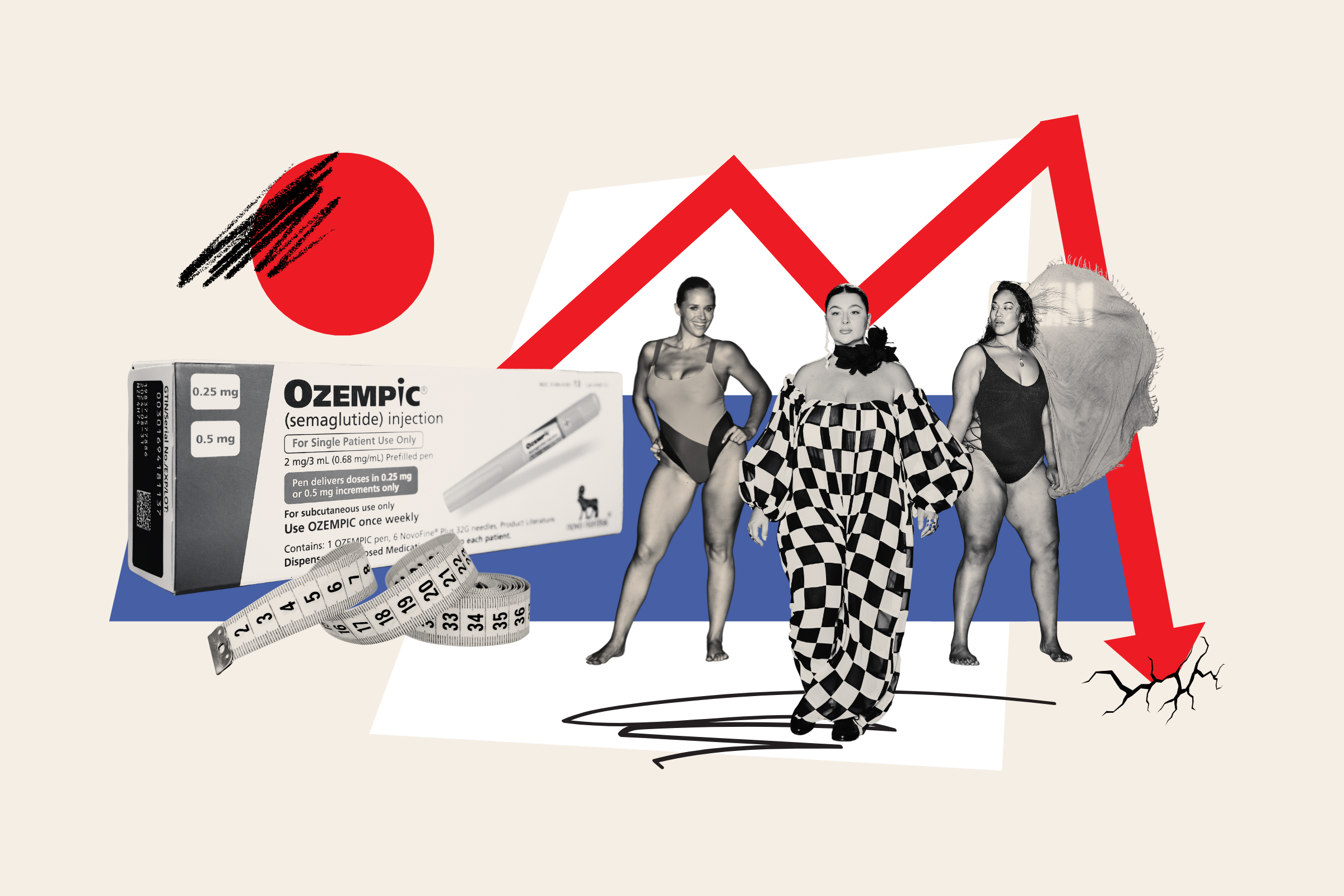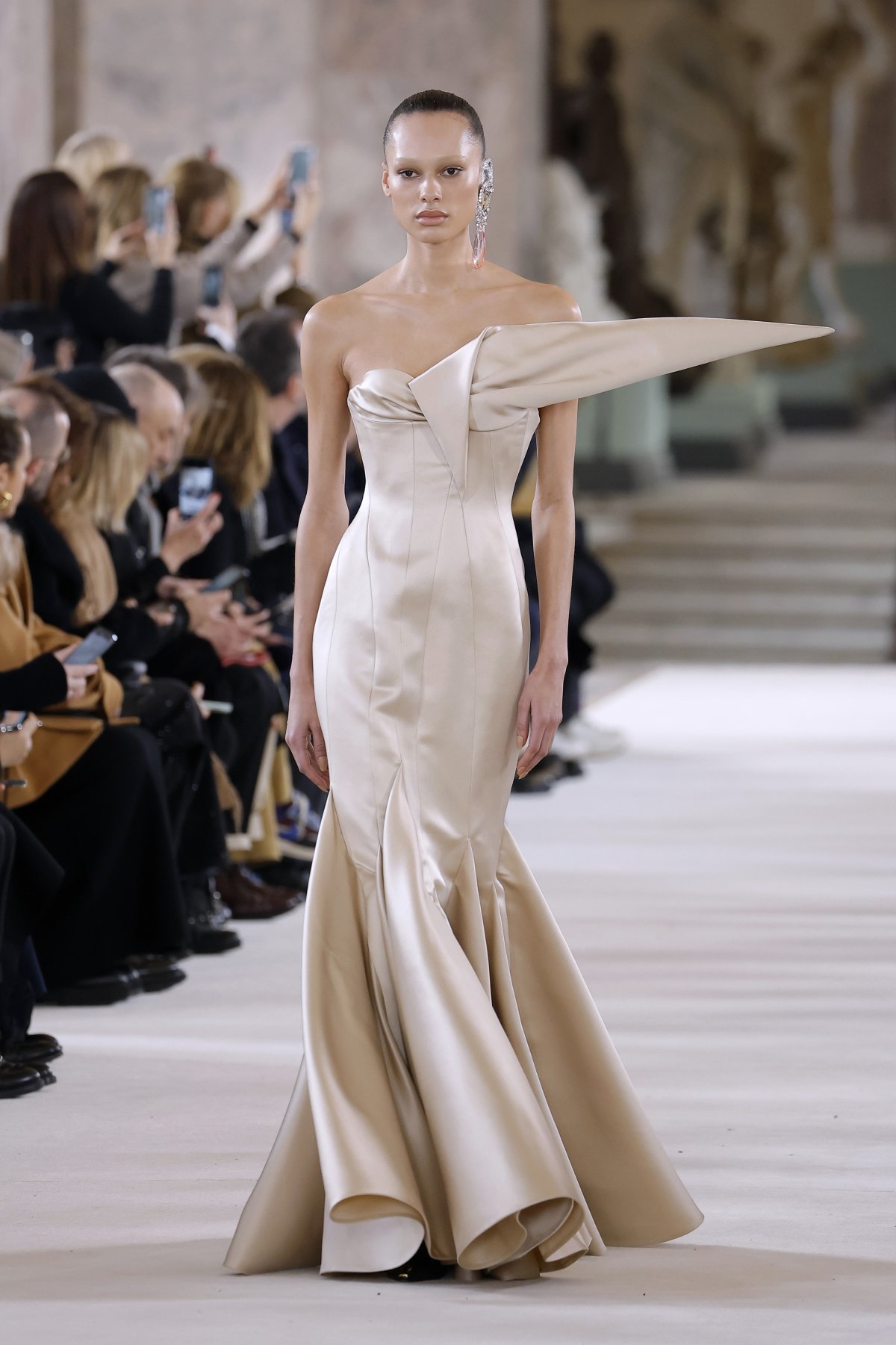Uncommon Knowledge
Newsweek is committed to challenging conventional wisdom and finding connections in the search for common ground.

The rise of weight-loss drugs like Ozempic has not only changed the way individuals approach their health and weight management but is also having a significant impact on the fashion industry.
As the popularity of weight-loss medications increases, the plus-size fashion market is experiencing notable shifts. This shift has fashion experts, designers and consumers wondering if the so-called “ultra-thinness” ideal, which was a staple of the ’90s and ’00s, is making a return and whether that spells trouble for the size-inclusive fashion market, business models, product lines, and the body positivity movement.
Ozempic is a prescription medication developed by leading Danish pharmaceutical company, Novo Nordisk. The drug works by mimicking a hormone that regulates appetite and digestion which in turn leads to reduced hunger and calorie intake. This combined with its ability to slow down digestion helps users reduce their body weight.
It was designed to treat and manage type 2 diabetes, but has found popularity because of its weight loss effects. Several celebrities are known to have used the drug.
A representative for Novo Nordisk told Newsweek that the company was “committed to the responsible use of our medicines.”
“Ozempic is not approved for chronic weight management,” the representative said.
Of the 8,800 looks presented across 230 shows and presentations during this year’s Autumn-Winter fashion season, just 0.8 percent were plus-size (US 14+) and 3.7 percent were mid-size (US 6-12). An overwhelming 95.5 percent were straight-size (US 0-4), according to Vogue Business, a website focused on fashion, luxury, and beauty trends.
Lucy Maguire, the Senior Trends Editor at Vogue Business spoke to Newsweek about the data and the influence of Ozempic on the fashion industry. She said, “Typically, it’s independent labels that always top our size inclusivity rankings across the big four cities. For [the Spring-Summer 2024 season], we also saw some really encouraging moves from major fashion houses. Brands like Balenciaga and Alexander McQueen both entered the top 10 ranking for the first time since we began collecting data.”

Maguire continued: “Last season, a lot of these brands went back to straight size models, which reduced the proportion of plus size models across the season. More generally, I’m seeing even the brands we deem to be size inclusive favoring mid-size models over plus.”
This sentiment was echoed by Molly Roakes, who runs a popular Instagram account called Style Analytics, which looks at “data-driven fashion insights.” Roakes explained to Newsweek that “while retailers’ internal studies have indicated an increase in sales of smaller-sized clothing over the past year, this trend is also evident in search data. For example, in the USA, searches for size 00 jeans at popular youth-focused retailers have risen by 8 percent in the past year.”
Newsweek also spoke with Marcy and Jen, who run The Plus Bus Boutique, an L.A. based business that sells sustainable, size-inclusive fashion and said that their sales were down.
While they attributed some of this to people no longer being happy to admit they might “need bigger pants,” they said that “it’s also due to the economy as our neighbors in our retail district are experiencing similar downturn.”
They said they “have always come across customers who are on a weight loss journey” since the shop opened in 2015.
They explained that they have been hearing about Ozempic for some time but that they are “not sure that it’s unlike any other diet drug or craze that will come and go.”
They added that, “the crazy thing about selling clothes to people who are losing weight or have lost weight is that more often than not they come back having gained that weight.”
“Size inclusivity is backsliding season after season at the moment,” said Maguire. “Of course, there’s a lot of discussion around Ozempic at the moment and its effects on public consciousness. With influencers and celebrities (men and women) shrinking before our eyes, some critics are saying that it’s giving designers license to return to straight size models. And it’s also influencing consumers to have a more homogenous idea of beauty. Which is what we were moving away from!”
Molly Roakes of Style Analytics believes weight-loss medications like Ozempic are “definitely” undoing progress made in size-inclusive fashion and work done by the body positivity movement.
“Ozempic has made achieving an overly-thin body type more accessible for many but in doing this has diminished the strides that were made to include all types of bodies in fashion,” she told Newsweek.
Newsweek has reached out to a representative for Novo Nordisk, the company that manufactures Ozempic, via email for comment.
Maguire agreed that ultra-thinness is re-emerging in fashion, and said male designers were a big factor.
“I think male designers have a very homogenous view of the female body unfortunately,” she said. “For example, most fashion isn’t even designed with a bra in mind. No one ever wears a bra on the runway.”
The Plus Bus Boutique owners felt the same about the idea of ultra-thinness, telling Newsweek that: “Ultra-thinness seems to always cycle back. Our American obsession with thinness will probably never go away. While we are making progress, fatphobia is rampant in our society.”
In light of this, it is likely that the size inclusive fashion industry will now continue to face obstacles. The women behind The Plus Bus Boutique told us that they think weight loss drugs have “contributed to fat bias being more ingrained in public discourse and therefore feels a lot more unsafe to be openly fat and living in a fat body that doesn’t want to become thin.”
Roakes noted that “fashion aesthetics like ‘indie sleaze’ and ‘heroin chic’ have gained popularity on platforms like TikTok and Pinterest in the past year.”
She told us that “while these trends haven’t fully manifested in mainstream fashion yet, they could be on the horizon.” She explained that these trends “especially when combined with cultural factors such as the influence of Ozempic and increased cigarette usage in the USA, could be poised for a comeback in the next few years.”
Roakes added that “there are a handful of high-fashion brands that have included mid-sized and plus-sized models on their runways when it was aligned with demands from their audience and the body-positive movement.”
“Many of these brands have continued to act on these promises in the advent of Ozempic, however, it will be interesting to see which brands will continue with these casting improvements as Ozempic usage continues to grow.”
Do you have a story we should be covering? Do you have any questions about Ozempic or other weight-loss drugs? Contact LiveNews@newsweek.com
Newsweek is committed to challenging conventional wisdom and finding connections in the search for common ground.
Newsweek is committed to challenging conventional wisdom and finding connections in the search for common ground.